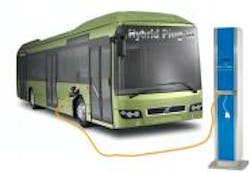“We expect to be able to reduce the energy consumption in a city bus by up to 65% [and] carbon-dioxide emissions by more than 75% with a plug-in hybrid compared with today’s diesel buses.” –Håkan Karlsson, Volvo Buses CEO
Here’s another alternatively-powered commercial vehicle design to keep your eye on for the future: the plug-in hybrid transit bus being developed by Volvo Buses, a division of Sweden’s AB Volvo.
Now, Volvo’s been building diesel-electric hybrid buses for a while now – in fact, it’s sold over 250 of them worldwide, and these hybrid models reduce diesel fuel consumption by 35% on average compared to their diesel-only brethren.
But the adding the “plug-in” piece takes fuel efficiency to a whole new level, potentially cutting diesel consumption by 65%, according to Volvo Buses, because it allows the electrical drivetrain to be re-powered independently of the diesel engine.
In short, the bus can run on just electricity alone and then be plugged in somewhere down to the line to recharge its batteries, without having to operate the diesel engine to perform those recharging duties.
[Here’s a look at a special “ride and drive” event Volvo held back in June showcasing its alternative powered vehicles – including a diesel-electric hybrid commercial truck, which uses a powertrain similar to Volvo’s hybrid buses.]
Volvo said its plug-in hybrid bus prototype – funded by grants from several government authorities, including the Swedish Energy Agency – is essentially the same Volvo hybrid bus as today, with the braking energy “recycled” to recharge its batteries and thus power the electric motor.
But with a new type of battery and recharging equipment, the plug-in hybrid’s battery pack can now be recharged by the electricity grid as well, the company noted.
[Of course, even with newfangled energy-saving vehicles, safety is never far from mind. Here’s a clip of Volvo crash-testing its hybrid trucks, especially to see how the battery pack holds up.]
Håkan Karlsson, Volvo Buses CEO, explained that the concept is based on placing battery charging stations at the end stations of the bus lines. By charging the battery there for five to ten minutes, it could significantly extend the time that the bus is able to operate only on electricity, he said.
Volvo Buses expects to have a prototype bus ready for initial testing in 2011, with field tests commencing in the fall of 2012 in Gothenburg, Sweden, using three plug-in hybrid models.
“It will take a few more years” after that for this plug-in hybrid bus to be available commercially, says Karlsson. “But we are convinced that this is a key step on the path to more efficient public transport and an important step in the effort to reduce global energy consumption.”
